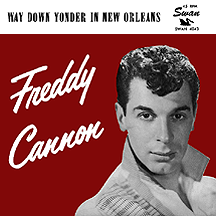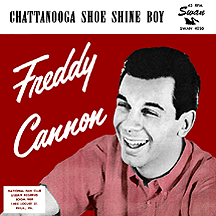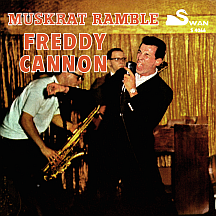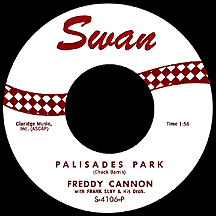FREDDY CANNON
Freddy "Boom Boom" Cannon delivered a raucous brand of rock and roll, always big, fast tempo multi-instrument productions featuring, more often than not, a healthy dose of his trademark "Wooo!" shouts. The music was fun, gimmicky, catchy...and popular.
Everyone's favorite Freddy-related story seems to be the one about wannabe songwriter Chuck Barris, former NBC page and office worker at ABC who came up with a simple 'down at the amusement park' ditty and presented Cannon's producer Bob Crewe with it. Crewe produced the record, adding roller coaster sound effects and a pipe organ, changing the title to the more-specific "Palisades Park" (the premier New Jersey fun center since 1898!). Freddy gave his usual enthusiastic performance ('...you'll never know how great a kiss can feel when you're stopped at the top of the ferris wheel,' an adrenaline rush, no doubt). It was the biggest hit of all for Cannon, and Barris took the approximately 60 thousand dollars that he made in royalties (according to Cannon) and put it toward making a pilot for a game show idea he had. That idea became The Dating Game, which premiered in 1965 and was followed by a string of successful series, including The Newlywed Game and the notorious 1970s freak show/talent competition The Gong Show, hosted with reckless abandon by Barris himself. He left any further songwriting possibilities unrealized and instead became a game show mogul.
Cannon, of course, was already three years into his successful run at the time of his musical tribute to Palisades Park. Born Frederick Picariello, Jr., it had been his good fortune to have a music-pro father. The elder Picariello played trumpet for many years with Boston area bands, while his love of music rubbed off on the youngster who studied guitar and, during his teens, was good enough at it to get work as a session player. The first record to feature Freddy's guitar work was "Cha Cha Doo" by The Spindrifts in early 1958 when he was 18. This break in the business gave him an excuse to hang around recording studios, which came in handy later when he decided to make his own records as a singer. A recurring on-camera stint as Freddy Karmon on a local show, Boston Ballroom, gave him exposure and a chance to sharpen his stage skills.
Turns out Freddy's mom also had an interest in music (don't we all wish we'd had such cool parents?) and came up with a song she called "Rock and Roll Baby," which Freddy demoed at the studio and sent to Crewe and arranger Frank Slay (a hot team at the time with The Rays' 57 smash "Silhouettes" to their credit). They liked the song but made some changes to the lyrics and gave it a new title (each taking a share of the writing credit). Under the title "Tallahassee Lassie," they shopped it around to labels but got no bites; even Philadelphia's Cameo label (which had scored with the Rays record) passed, but another Philly company, Swan Records, showed interest. After Dick Clark added his two cents (and let's face it, Dick controlled the Philly music scene in those days), the song was redone with a "bigger" sound, using a pounding bass drum to complement Cannon's Chuck Berry-inspired lead guitar licks and adding those well-timed "Wooo"s that would become his trademark on many future recordings. When Swan president Bernie Binnick heard the revised take, he flipped, suggesting the stage name Freddy Cannon to further identify the song's, and artist's, thunderous quality. All of the pieces were in place for the record to make an impact.
It took off immediately, hitting big in the Boston market with the help of airplay from WMEX disc jockey Arnie "Woo Woo" Ginsburg; the two became lifelong friends (note the woo factor as a trademark for each of them). The single quickly broke nationwide, landing in the top ten in June 1959, its initial exposure on Clark's American Bandstand fueling its rise. Follow-up "Okefenokee" retained the pounding beat, then Crewe, Slay and company went with a rocked-up version of "Way Down Yonder in New Orleans," a 1922 tune written by Henry Creamer and Turner Layton (originally a hit for The Peerless Quartet). The antiquity of the original was nowhere to be found in the big orchestra production of Cannon's version and in December '59 it went even higher on the charts than "Tallahassee Lassie," giving the young singer two top ten hits by year's end, a solid start for any act.
The "Boom Boom" nickname (derived from the Cannon stage name) was widespread by this time and Freddy's unique image put him in a league with the top acts of the day. A common theme had emerged, as each of the '59 releases had been set in a city (Tallahassee, New Orleans) or place (Georgia's Okefenokee swamp). The first single of the '60s was set in a Tennessee town, a remake of the huge 1950 hit by Red Foley (and others), "Chattanooga Shoe Shine Boy" (a Harry Stone-Jack Stapp song title-adjusted from "Chattanoogie"). Next up was the Slay-Crewe two-sider "Jump Over" and "The Urge." In England, where Freddy was also enjoying a run of hits and had recently reached the number one spot on the album charts with The Explosive Freddy Cannon, the British TV program Juke Box Jury (a spinoff of Jukebox Jury in the U.S.) played "The Urge" and panelist Katie Boyle (an Italian-born actress and model in Britain) famously gave her review of the record: "It's obscene, but I love it!" The song, not really that suggestive beyond the title, was the single's more popular side in the U.K.
1961 was a difficult year hitwise, but Cannon's many appearances on American Bandstand kept him in the public eye. All total Freddy was on the show over a hundred times, more than any other music act. A "guest artist" shot on the Danny and the Juniors single "Twistin' All Night Long" kicked off '62 and with the top ten "Palisades Park" he was back in the game, extending his chart streak into the following year when a performance of a song in the British film Just For Fun (starring U.K. teen idol Mark Wynter and also featuring American singers Bobby Vee, Johnny Tillotson, Ketty Lester and soon-to-be British Invasion star Dusty Springfield) became his first foray into the movie biz.
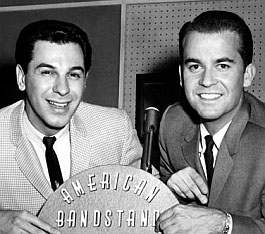
His five year contract with Swan on the wane, Freddy signed with Warner Bros. Records and, still working with Frank Slay in addition to a whole new group of creative major label players (including producer Dick Glasser and arrangers Charlie Calello and Al Capps), Cannon connected immediately with the Richard Heard-Robert Boulanger song "Abigail Beecher" (the coolest of all XKE-driving high school history teachers), a top 20 hit in February 1964. The following year was even better: he made his acting debut in a March episode of the ABC-TV sitcom No Time For Sergeants, then supplied the theme for Clark's daytime ABC music series Where the Action Is, which premiered in June. The single release, titled simply "Action," put him back in the top 20 in September '65. Another film appearance, this time in the notoriously bad cult oddity Village of the Giants, very loosely based on the 1904 H.G. Wells novel Food of the Gods and starring Beau Bridges, Tommy Kirk, Johnny Crawford and Ronny Howard (each no doubt keeping their fingers crossed all these years that no one will rediscover the film), also featured singers Mike Clifford and Toni Basil and San Francisco rockers The Beau Brummels.
One more chart hit, Russ Regan's "The Dedication Song," came in early 1966, but the changing music scene had caught up with Cannon and Warner Bros. cut him loose in mid-1967. He recorded for several record labels over the next two decades, adding up to a full baker's dozen, but was never able to recapture the 1959 through '66 Swan/WB heyday. In 1981 he briefly enjoyed a comeback single with The Belmonts, "Let's Put the Fun Back in Rock and Roll" on the MiaSound label, then delivered his movie career swan song in the action film Junkman the following year. After that, in cooperation with longtime friend Dick Clark, he headlined many Bandstand reunion concerts, keeping the "Boom Boom" and the "Wooo" and the fun Freddy Cannon persona going strong.
NOTABLE SINGLES:
- Tallahassee Lassie - 1959
- Okefenokee - 1959
- Way Down Yonder in New Orleans - 1959
- Chattanooga Shoe Shine Boy /
Boston "My Home Town" - 1960 - Jump Over /
The Urge - 1960 - Happy Shades of Blue - 1960
- Humdinger - 1960
- Muskrat Ramble - 1961
- Buzz Buzz A-Diddle-It /
Opportunity - 1961 - Transistor Sister - 1961
- For Me and My Gal - 1961
- Twistin' All Night Long - 1962
by Danny and the Juniors with guest artist Freddy Cannon - Teen Queen of the Week - 1962
- Palisades Park - 1962
- What's Gonna Happen When Summer's Done - 1962
- If You Were a Rock and Roll Record - 1962
- Four Letter Man - 1963
- Patty Baby - 1963
- Everybody Monkey - 1963
- Abigail Beecher - 1964
- In the Night - 1965
- Action - 1965
- Let Me Show You Where it's At - 1965
- The Dedication Song - 1966
- The Laughing Song - 1966
- Let's Put the Fun Back in Rock n Roll - 1981
by Freddy Cannon and the Belmonts


